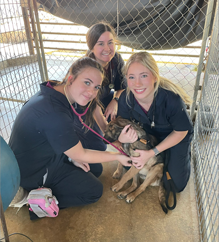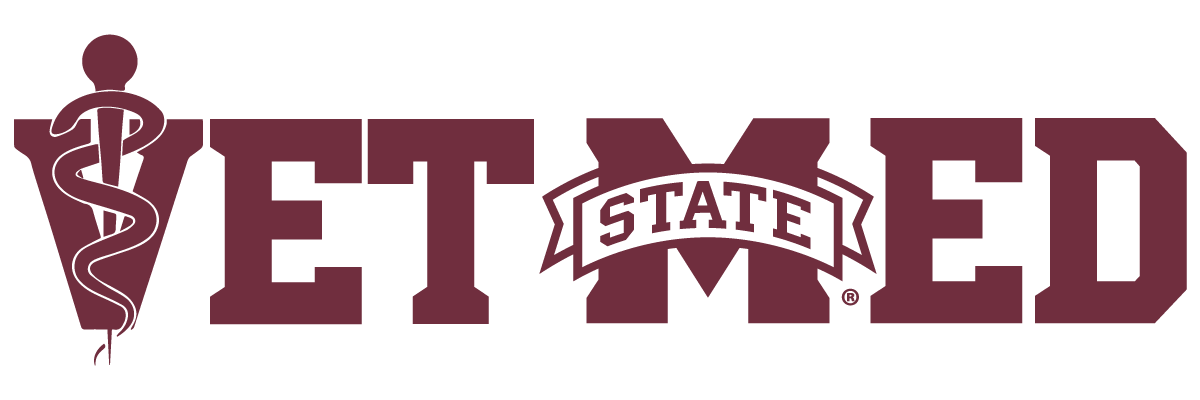It's Like a Nurse, but for Animals

The College of Veterinary Medicine at Mississippi State University is one of only a handful of veterinary schools that houses a full undergraduate Veterinary Medical Technology program. What is a veterinary medical technologist? It's like a nurse, but for animals. Our students work hand in hand with veterinary students to learn the skills, expertise, and gain the critical experience that will allow them to become professional animal care-givers and leaders in their field. Learn about all the exciting things you can do with a degree in Veterinary Medical Technology by clicking here.
Applying to the Program
There are two ways to apply to the Veterinary Medical Technology program. After you have been accepted as a student at Mississippi State University, you may apply for the program. Regular applications are accepted between Feb.1 through March 1 of each year.
Regular Admission
To apply you must complete the following:
1. Ensure you have completed or will complete all pre-requisites.
2. Complete this application.
3. Obtain three letters of recommendation. You may ask your recommenders to complete the following form. We recommend one of your recommenders be able to speak to your academic background and another speak to your animal handling experience. The third may be a person of your choice. If your evaluators have questions, you may send them this link.
4. After completing and obtaining all application items, mail them to:
C/O Mandi Yates
PO Box 6100
Mississippi State, MS 39762
Please note that applications must be submitted in a single envelope. Applications that arrive in separate envelopes will not be reviewed.
Applicants who move beyond application review will be invited to take part in a formal interview.
For more detailed instructions for application please click here.
Pre-Admission (for high school seniors or first semester college students):
Students may also elect to pre-apply for the Veterinary Medical Technology program. Successful pre-admission will ensure that your spot is held when you enter the University. Pre-admission applications are accepted between Oct. 1 and Nov. 1 of each year.
To pre-apply students must do the following.
1. Ensure you have completed or will complete all pre-requisites.
3. Obtain your official transcripts from your high school.*
4. Obtain three letters of recommendation. You may ask your recommenders to complete the following form. We recommend one of your recommenders be able to speak to your academic background and another speak to your animal handling experience. The third may be a person of your choice. If your evaluators have questions, you may send them this link.
5. After completing and obtaining all application items, mail them to:
C/O Mandi Yates
PO Box 6100
Mississippi State, MS 39762
Please note that applications must be submitted in a single envelope. Applications that arrive in separate envelopes will not be reviewed.
*Please send any college transcripts to Mississippi State University's registrar's office.
Applicants who move beyond application review will be invited to take part in a formal interview.
For more detailed instructions for applying to the pre-admission program, please click here.
Entrance Requirements
For either the pre-admission or regular admission tracks, students must have shown evidence of academic success and have completed or will complete before high school graduation a selection of courses. Details are listed for each track below.
Regular Admission
- 2.5 GPA
- Completed applications to the program
- Interview
Pre-admission
- 3.0 GPA (high school seniors)
- 2.8 GPA (first-semester college freshmen)
- 21 ACT (super score)
- Completed application to the program
- Interview
General course prerequisites:
- English Comp I & II
- College Algebra1
- Trigonometry or Intro to Statistics
- Survey of Chemistry I & II
- Experimental Chemistry (lab)
- Social Behaviors (6 hours)
- Humanities (6 hours)
- Biology I & II
- Microbiology
- Fine Arts
- Speech
- Animal Science or Animal Anatomy & Physiology
Program-specific prerequisites (these may be completed at a community college or can be substituted for equivalent classes. Please contact Veterinary Medical Technology office for more information at msuvmt@cvm.msstate.edu)
- Careers in Veterinary Medicine or Careers Exploration Course
- Veterinary Medical Technology Terminology or Medical Terminology
All prerequisites must be completed with a C or better.
If you have questions regarding applications, contact the VMT office at (662) 325-1103 or email msuvmt@cvm.msstate.edu.
Contact Us:
Phone: 662-325-1103 Email: msuvmt@cvm.msstate.edu
Follow Us on Social Media!
Credentialing Information:
- AAVSB
- MS State Certification
The Mississippi State University College of Veterinary Medicine VMT program is fully accredited by the American Veterinary Medical Association on Veterinary Technician Education and Activities.
VTNE Pass Rate
|
VTNE Pass Rate |
|
|
|
The three-year pass percentage on VTNE is calculated as follows: X/Y*100= three-year pass percentage whereby X is the number of first-time candidates that passed the VTNE and Y is the number of first-time candidates that have taken the VTNE |
|
January 1,2022-December 31, 2024 |
|
Number of 1st time candidates that have taken the VTNE |
|
81 |
|
Three-year VTNE pass percentage |
|
69% |
GRADING RUBRICS
Anatomical Pathology Basics of Practice Procedures Clinical Pathology Diagnostic Imaging Lab Animal Nursing Skills and Husbandry Parasitology Pharmacology Surgical Nursing
Department of Veterinary Medical Technology
PO Box 6100
Mississippi State, MS 39762
Phone: 662.325.1103
Fax: 662.325.7506
Email: msuvmt@cvm.msstate.edu
